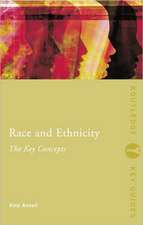From Dessalines to Duvalier – Race, Colour and National Independence in Haiti
Autor David Nichollsen Limba Engleză Paperback – 31 dec 1995
In this lively, provocative, and well-documented history, David Nicholls discusses the impact of "color" on the political relationship between the black majority and the mulatto elite during almost two hundred years of Haitian history. The divisive factor impeding harmony in Haitian culture, argues Nicholls, has not been race, but color. Identifying themselves as non-white, blacks and mulattos acknowledge racial unity. But color divisions, reinforced by religious, regional, and class differences, have nonetheless prevented the two groups from achieving poltitical and ideological unity. Nicholls grounds this sophisticated analysis in great historical detail and engaging, witty prose. Students and general readers alike will delight in this insightful and informative history of Haiti.
Preț: 304.22 lei
Nou
Puncte Express: 456
Preț estimativ în valută:
58.22€ • 61.25$ • 48.58£
58.22€ • 61.25$ • 48.58£
Carte tipărită la comandă
Livrare economică 09-23 ianuarie 25
Preluare comenzi: 021 569.72.76
Specificații
ISBN-13: 9780813522401
ISBN-10: 0813522404
Pagini: 408
Dimensiuni: 140 x 216 x 28 mm
Greutate: 0.49 kg
Ediția:None
Editura: Wiley
ISBN-10: 0813522404
Pagini: 408
Dimensiuni: 140 x 216 x 28 mm
Greutate: 0.49 kg
Ediția:None
Editura: Wiley
Notă biografică
David Nicholls is a major authority on Haiti, and was in the country as a newspaper correspondent during the 1987 election disaster. His other books include Haiti in Caribbean Context: Ethnicity, The Pluralist State, and Deity and Domination.
Cuprins
1. Introduction
2. Fathers of national independence (1804 -1825)
3. Pride and prejudice (1820 - 1867)
4. Liberals and Nationals (1867 - 1910)
5. Occupied Haiti (1911 - 1934)
6. Literature and dogma (1930 - 1945)
7. Authentics and their adversaries (1946 - 1957)
8. Culture and tyranny (1957 - 1971)
9. Conclusion
2. Fathers of national independence (1804 -1825)
3. Pride and prejudice (1820 - 1867)
4. Liberals and Nationals (1867 - 1910)
5. Occupied Haiti (1911 - 1934)
6. Literature and dogma (1930 - 1945)
7. Authentics and their adversaries (1946 - 1957)
8. Culture and tyranny (1957 - 1971)
9. Conclusion
Recenzii
Probably the best book written about Haitian history after its independence... a thorough, thoughtful, extremely well-researched work.
Step by step, [Nicholls] guides us through the various historical time periods of Haitian political and national development, illuminating each one of them by a cogent and learned discussion of the main idea and ideologies that accompanied them.
Rich in subject matter and eminently relatable, this book is also a fine work of scholarship. The more than 1,200 footnotes are models of clarity and relevance; the bibliography and index seem scrupulously accurate... While each generation must rewrite its own history, as Nicholls remarks, no book on Haiti for a long time to come will probably be able to ignore the analysis he here provides.
Step by step, [Nicholls] guides us through the various historical time periods of Haitian political and national development, illuminating each one of them by a cogent and learned discussion of the main idea and ideologies that accompanied them.
Rich in subject matter and eminently relatable, this book is also a fine work of scholarship. The more than 1,200 footnotes are models of clarity and relevance; the bibliography and index seem scrupulously accurate... While each generation must rewrite its own history, as Nicholls remarks, no book on Haiti for a long time to come will probably be able to ignore the analysis he here provides.
Descriere
In this lively, provocative, and well-documented history, David Nicholls discusses the impact of "color" on the political relationship between the black majority and the mulatto elite during almost two hundred years of Haitian history.
















